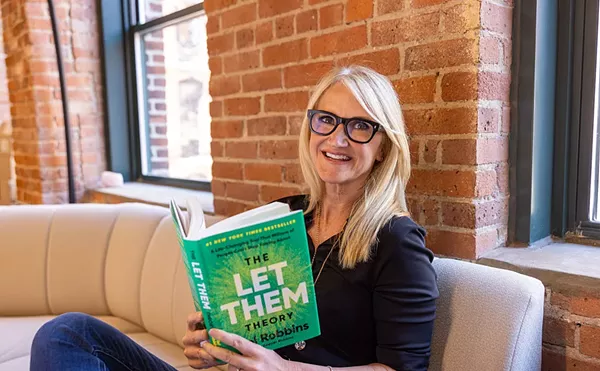What was actually playing out before me was Lindsay-Abaire's first play, the one that jump-started his career more than a decade ago when it debuted in an acclaimed New York production that garnered glowing reviews and played to sold-out houses for weeks. Fuddy Meers (the title means "funny mirrors," as spoken by one of the characters who's had a stroke) tells the story of Claire, a woman with amnesia who's kidnapped by a pair of escaped convicts, one of whom talks to a demented sock puppet he wears on his right hand. The bad guys take Claire to her mother's house, where they're joined by Claire's husband and teenaged son and a police officer they've abducted along the way. While Claire pieces together bits of past memories, everyone around her screams and scuffles and enacts rather violent comedy, very little of which I found funny.
The calm at the center of this silly storm is Stevens, who in my drama-class fantasy is trying to persuade Kerry McCue, as the cop, to stop screaming and flailing her arms to indicate anger. And fear. And happiness. But McCue is an obstreperous student who continues to thrash her way through two whole acts, thus earning an F for technique. David Weiss, in my acting-class story, is apparently a freshman whom Stevens is trying to teach with one of those wacky Method acting techniques, perhaps something like "pretend you're a clothespin," because Weiss sort of just stands around, spouting his lines while Stevens demonstrates how to play comedy with a little subtlety to make it funnier.
In my imaginary acting class, Devon Nickel's homework appears to have been about how to play a stereotype, because his teen stoner is a Central Casting pothead whose performance offers nothing new or especially amusing. Joseph Kremer's convict on the lam might have earned him a B- for range of emotion and for underplaying the few comic lines his character is afforded, and Jacqueline Gaston would have received a better-than-passing grade for making the most of a thankless role: the grouchy grandma whose stroke renders her many lines of dialogue largely unintelligible. Ron May is clearly teacher's pet in my make-believe classroom; how else to explain the fact that he's allowed to play an over-the-top character with such wild abandon? His performance, which is perhaps the most interesting in this production, is often spoiled by its own excess.
The reality, of course, is that the responsibility for these performances belongs not to Stevens, but to director Andrés Alcalá, who failed to assist his actors in calming their histrionics. The result is a story told with such manic abandon that much of its content is trumped by thrashing and squawking that's illuminated largely by a single performance.











